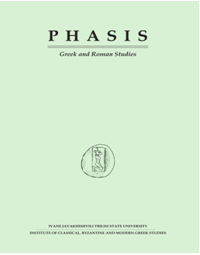Der persische Großkönig und die Griechen in klassischer Zeit: Kontinuitäten? Brüche? – Dominanz? Abhängigkeiten?
DOI:
https://doi.org/10.48614/phasis.18.2015.320-334Abstract
While Greco-Persian relations throughout the 5th century BC are shaped by dramatic events such as the Ionian revolt (500-494 BC), the campaign of Datis (490 BC) and the expedition of Xerxes (480/479 BC), they do appear to have been passing off in a rather calm way during the first decades of the 4th century BC. Since the ending of the Peloponnesian War, the influence of the Great King in Greece became more tangible than in the previous decades. Among contemporaries, the peace of Antalkidas (387/86 BC) was deemed as being “sent down by the Great King“ (cf. Xen. Hell. 5.1.36). Modern research into the period after these events alternates between the two extremes of an informal hegemony of the Achaemenids on the one hand and an inherent weakness of the Persian Empire on the other. It is the aim of this contribution to emphasize that the essential principles of Greco-Persian relations largely remained the same in many respects throughout the course of the 5th and 4th centuries BC – in terms of applied resources, locations and agents, along with the various appropriable options. Direct intervention and – above all – military intrusions such as those lead by Xerxes and Alexander the Great always constituted exceptional courses of events. In respect to an evaluation of Persian policy in regard to Greece, the expectations and intentions of the Achaemenids as representatives of a major Imperial power towards this arena and its protagonist have to be considered. Therein lie interesting parallels to other major powers in antiquity (such as the Roman Empire during the Imperial Era), especially in their core-periphery-relations.
Downloads
Published
Issue
Section
License
Copyright (c) 2015 Journal Phasis - Greek and Roman Studies

This work is licensed under a Creative Commons Attribution-NonCommercial 4.0 International License.


